北师大(三起)三年级英语下册课件 unit 12 Review(4)
文档属性
| 名称 | 北师大(三起)三年级英语下册课件 unit 12 Review(4) | 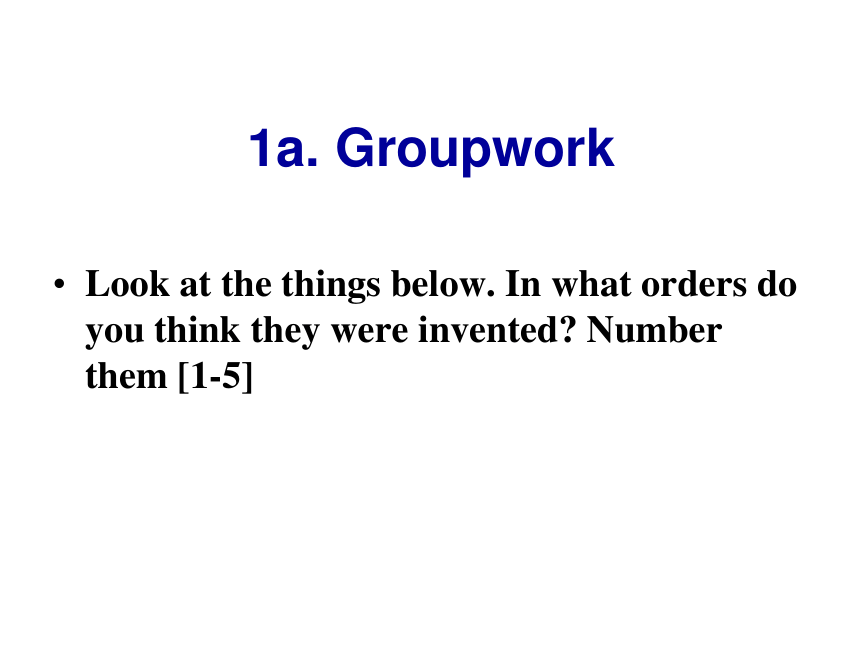 | |
| 格式 | zip | ||
| 文件大小 | 1.8MB | ||
| 资源类型 | 教案 | ||
| 版本资源 | 北师大版 | ||
| 科目 | 英语 | ||
| 更新时间 | 2013-01-30 16:57:30 | ||
图片预览

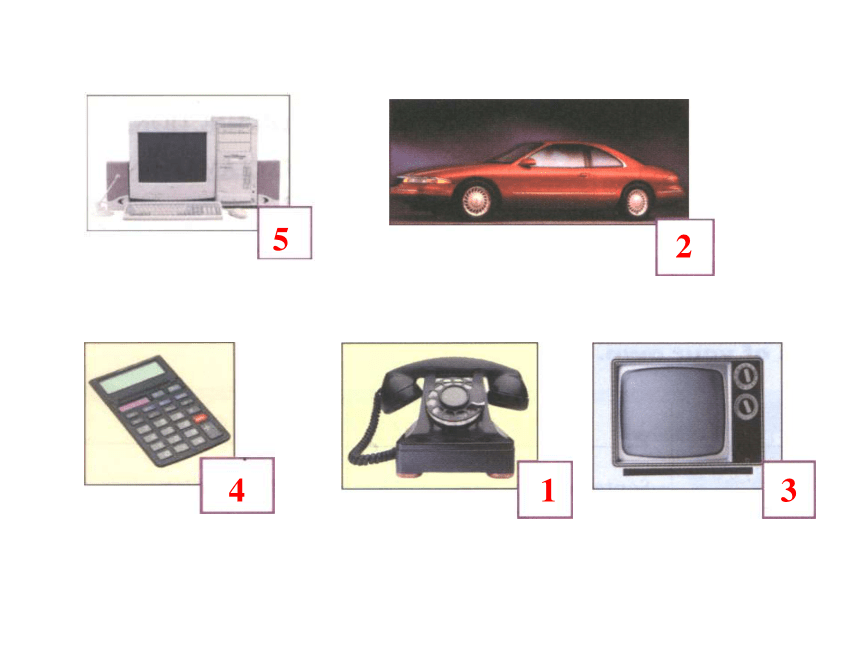
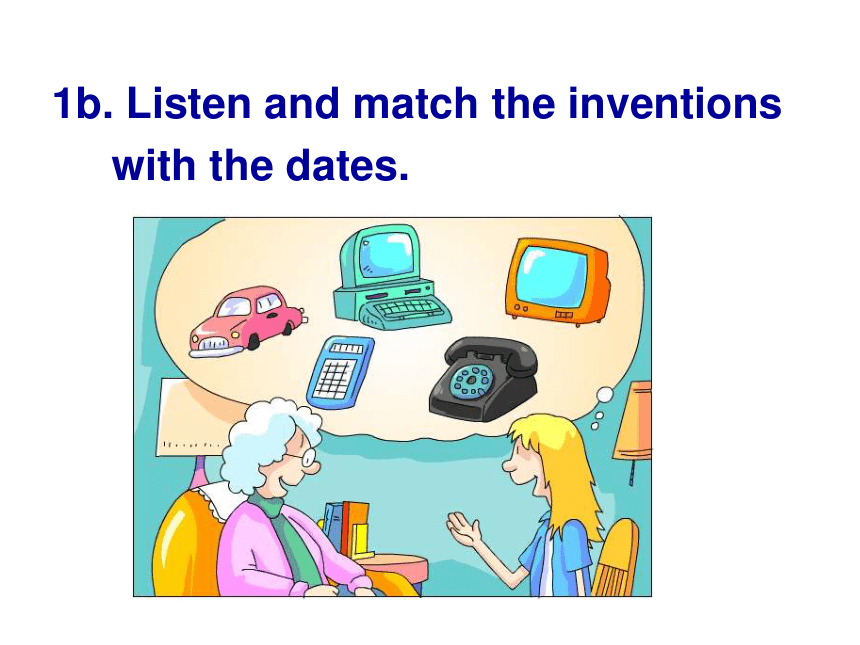
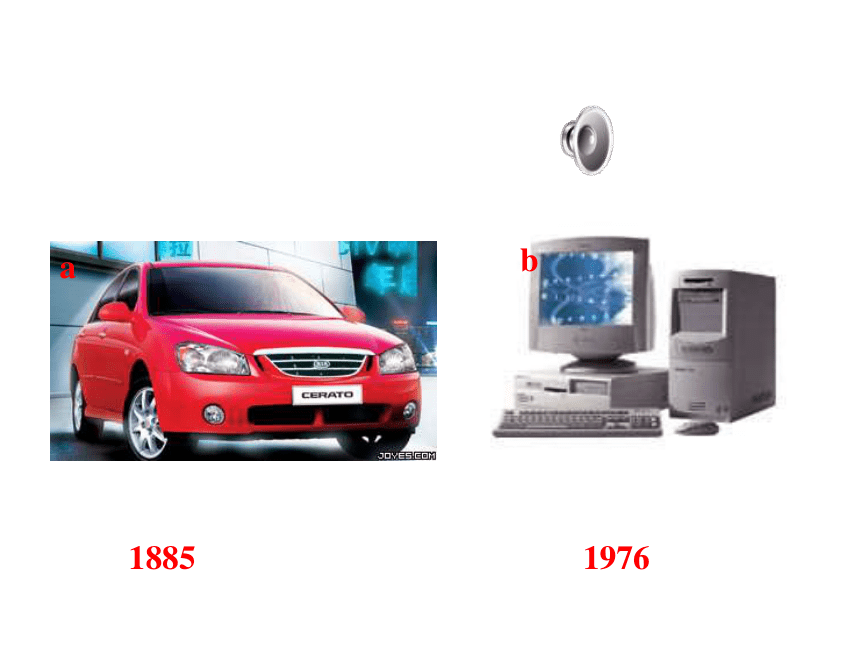
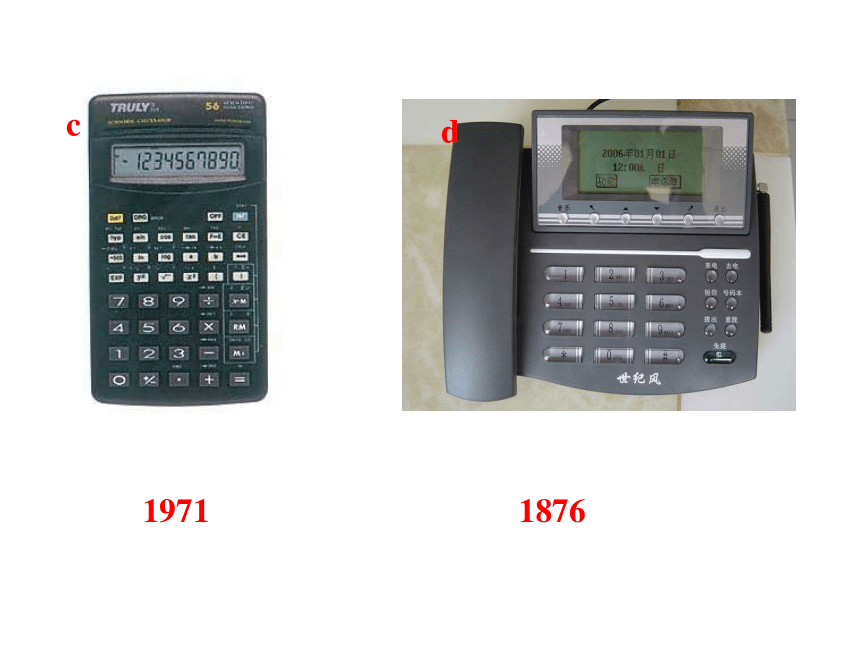
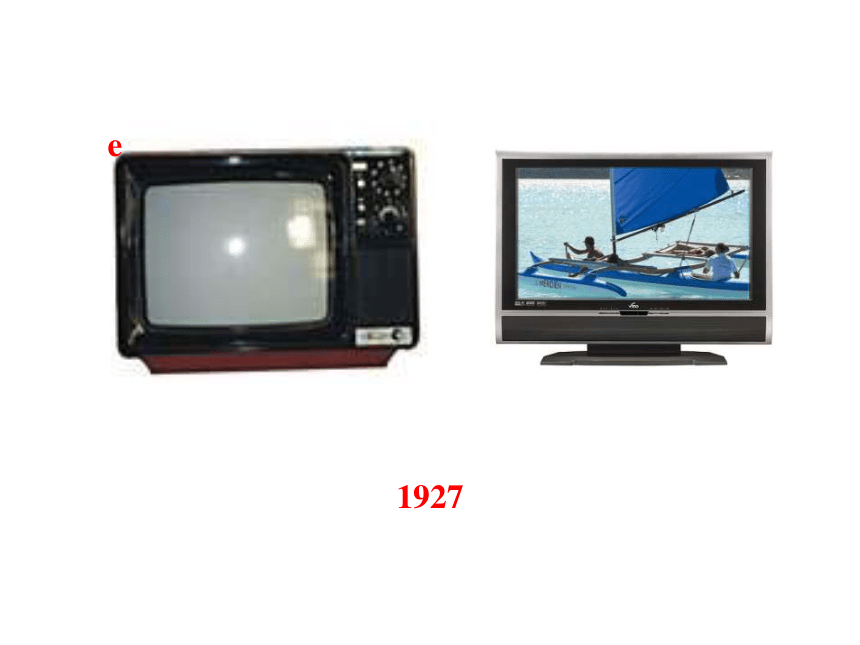
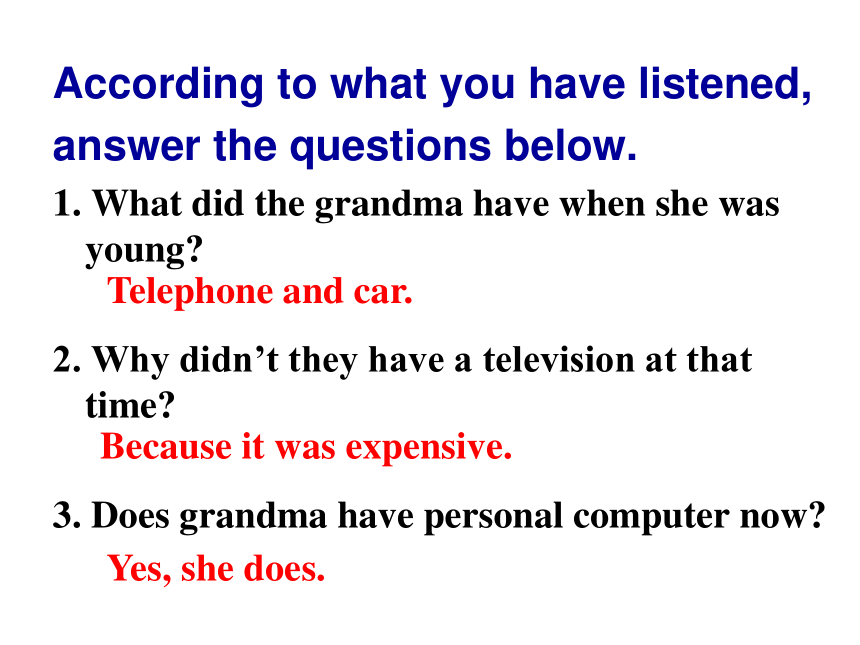
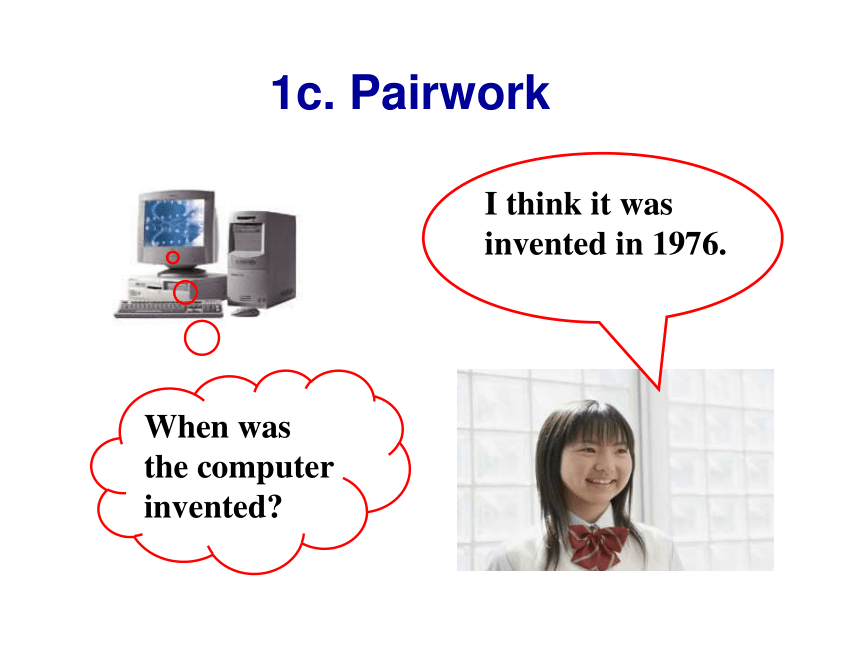
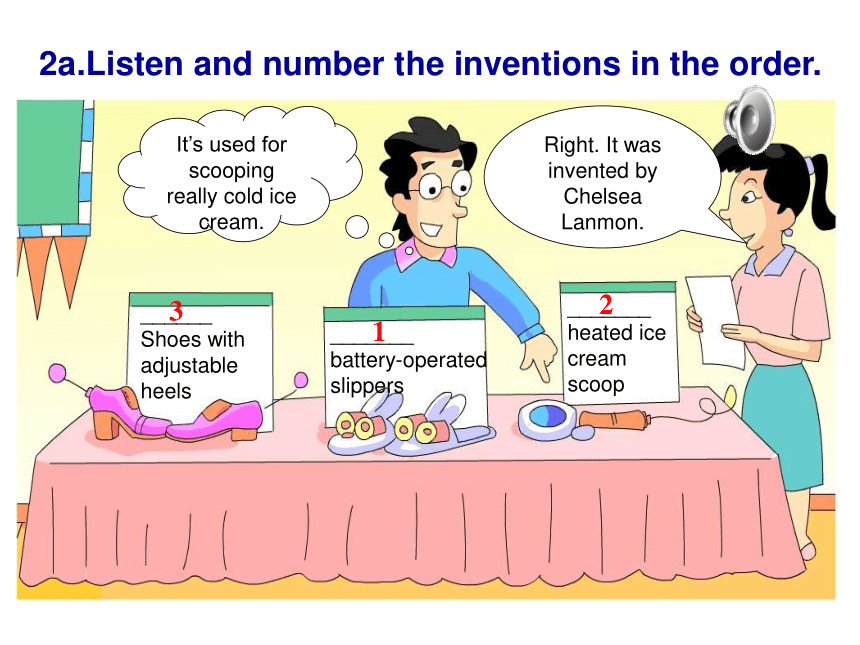
文档简介
课件28张PPT。1a. Groupwork Look at the things below. In what orders do you think they were invented? Number them [1-5]524131b. Listen and match the inventions
with the dates. 18851976ab19711876cd1927eAccording to what you have listened,
answer the questions below.
1. What did the grandma have when she was young?
2. Why didn’t they have a television at that time?
3. Does grandma have personal computer now?
Telephone and car. Because it was expensive. Yes, she does. 1c. Pairwork When was the computer invented?I think it was invented in 1976.______
Shoes with
adjustable
heelsIt’s used for scooping really cold ice cream.Right. It was invented by Chelsea Lanmon._______
battery-operated
slippers_______
heated ice
cream
scoop2a.Listen and number the inventions in the order.3122b. Listen again and match the items in
columns.2c. Pairwork What is it used for?It is used for seeing in the
dark.3a. Hate it or like it? alarm clockcameralight bulbherbicidemicrowave ovenrefrigeratorvedio graphying machine3b. Pairwork A: what do you think is the most
helpful invention?
B: I think the most helpful
invention is the computer.
A: why is that?
B: Because it helps me search
the information that I need. 4. GroupworkImagine that you are alone on a tiny island. Choose five inventions you would like to have on the island with you.A: I’d like to have a radio
because I could listen
to music all day.
B: Yes, but that’s not
going to help you leave
the island. I think it
would be better to have
a telephone.
Explanation 1. It’s used for scooping really cold ice cream.
be used for 意为“被用来……”,强调用途或作用。
e.g. The duster is used for cleaning the rooms.
be used as 意为”被当作……来用”,强调被当作工具或手段来用。
be used by 意为“被……使用,强调使用者。
e.g. The big box is used as a table.
The car is used by our manager. 3. Battery-operated slippers were invented by…
operate用法:
(1) “操作”
e.g. Can you operate the computer?
(2)“起作用,见效果”
e.g.The sleeping pill operated at once.
(3)“经营,管理”
e.g.The company operates ten factories.
(4)“动手术”
e.g.The doctor will operate on his mother next week.4. annoying adj. 讨厌的, 恼人的 (往往指事物)
e.g. How annoying it is! 真讨厌。
annoyed adj. 生气的, 恼怒的 (往往指人)
e.g. My father is annoyed with me.
爸爸在生我的气。
5. helpful adj. 有帮助的, 有益的
e.g. Mr. White is a very helpful man.
构词法:n + ful → adj
e.g. use + ful → useful
thank + ful → thankful
beauty+ ful → beautiful
care + ful → careful
6. Imagine that you are alone on tiny island.
alone adj. 意为“单独的”, 不带感彩。
e.g. When his wife died, he lived alone.
lonely adj. 意为“孤独的, 寂寞的”
e.g. He feels lonely when he is alone.
lonely 指地方时表示“荒凉的, 偏僻的”
e.g. The old man lives in a lonely small village.7. I think it would be better to have…
(1) would 在此处表示“料想或猜想、揣测”,后接动词原形或完成式。
e.g. What would she be doing there?
(2)It is better to do sth… “最好做……“,it是形式主语,动词不定式是真正的主语。
e.g. It is better for you to walk to school.
It is better to do sth…=had better to do sth…Grammar focus
with the dates. 18851976ab19711876cd1927eAccording to what you have listened,
answer the questions below.
1. What did the grandma have when she was young?
2. Why didn’t they have a television at that time?
3. Does grandma have personal computer now?
Telephone and car. Because it was expensive. Yes, she does. 1c. Pairwork When was the computer invented?I think it was invented in 1976.______
Shoes with
adjustable
heelsIt’s used for scooping really cold ice cream.Right. It was invented by Chelsea Lanmon._______
battery-operated
slippers_______
heated ice
cream
scoop2a.Listen and number the inventions in the order.3122b. Listen again and match the items in
columns.2c. Pairwork What is it used for?It is used for seeing in the
dark.3a. Hate it or like it? alarm clockcameralight bulbherbicidemicrowave ovenrefrigeratorvedio graphying machine3b. Pairwork A: what do you think is the most
helpful invention?
B: I think the most helpful
invention is the computer.
A: why is that?
B: Because it helps me search
the information that I need. 4. GroupworkImagine that you are alone on a tiny island. Choose five inventions you would like to have on the island with you.A: I’d like to have a radio
because I could listen
to music all day.
B: Yes, but that’s not
going to help you leave
the island. I think it
would be better to have
a telephone.
Explanation 1. It’s used for scooping really cold ice cream.
be used for 意为“被用来……”,强调用途或作用。
e.g. The duster is used for cleaning the rooms.
be used as 意为”被当作……来用”,强调被当作工具或手段来用。
be used by 意为“被……使用,强调使用者。
e.g. The big box is used as a table.
The car is used by our manager. 3. Battery-operated slippers were invented by…
operate用法:
(1) “操作”
e.g. Can you operate the computer?
(2)“起作用,见效果”
e.g.The sleeping pill operated at once.
(3)“经营,管理”
e.g.The company operates ten factories.
(4)“动手术”
e.g.The doctor will operate on his mother next week.4. annoying adj. 讨厌的, 恼人的 (往往指事物)
e.g. How annoying it is! 真讨厌。
annoyed adj. 生气的, 恼怒的 (往往指人)
e.g. My father is annoyed with me.
爸爸在生我的气。
5. helpful adj. 有帮助的, 有益的
e.g. Mr. White is a very helpful man.
构词法:n + ful → adj
e.g. use + ful → useful
thank + ful → thankful
beauty+ ful → beautiful
care + ful → careful
6. Imagine that you are alone on tiny island.
alone adj. 意为“单独的”, 不带感彩。
e.g. When his wife died, he lived alone.
lonely adj. 意为“孤独的, 寂寞的”
e.g. He feels lonely when he is alone.
lonely 指地方时表示“荒凉的, 偏僻的”
e.g. The old man lives in a lonely small village.7. I think it would be better to have…
(1) would 在此处表示“料想或猜想、揣测”,后接动词原形或完成式。
e.g. What would she be doing there?
(2)It is better to do sth… “最好做……“,it是形式主语,动词不定式是真正的主语。
e.g. It is better for you to walk to school.
It is better to do sth…=had better to do sth…Grammar focus
